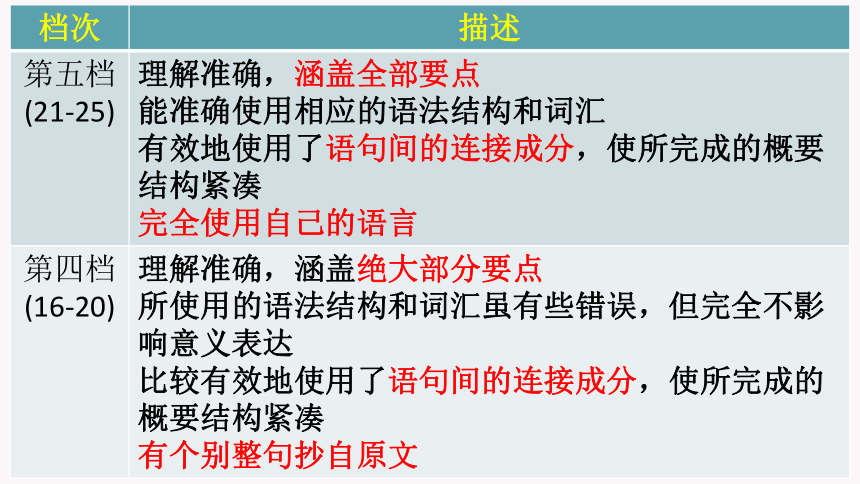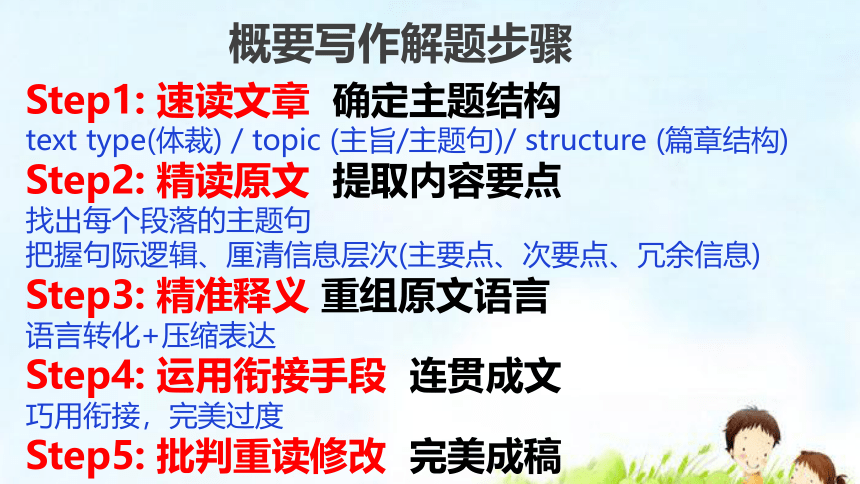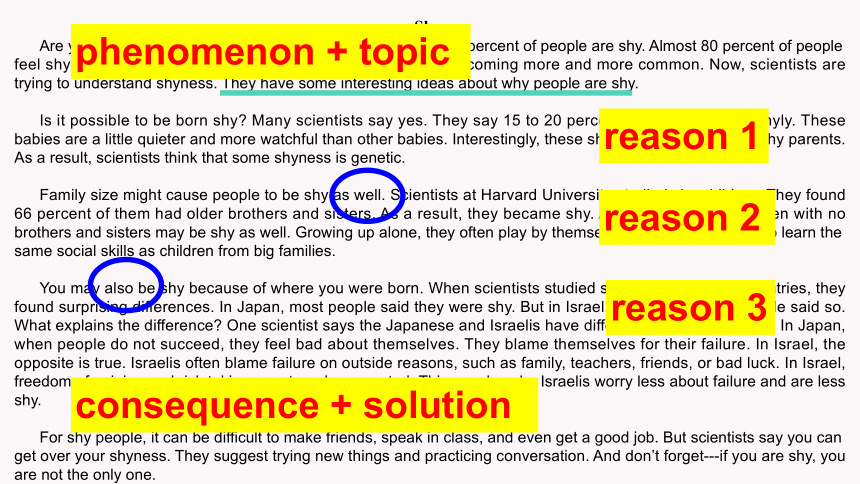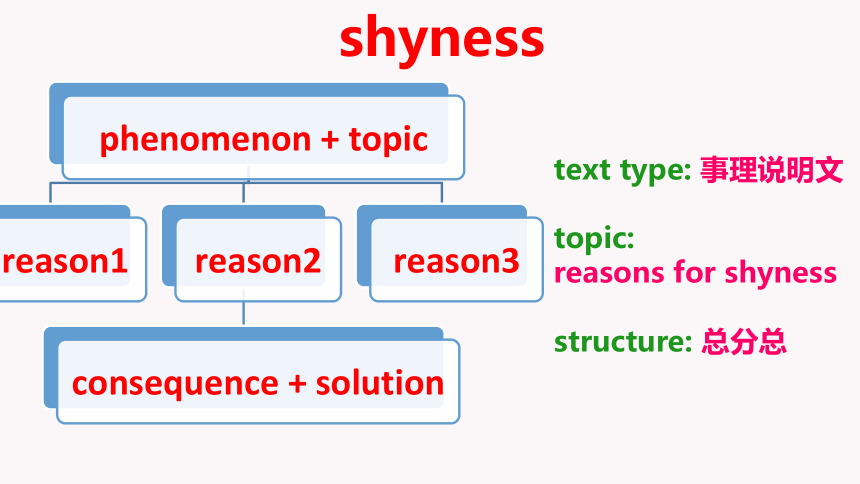高中英语概要写作(41张PPT)
图片预览












文档简介
(共41张PPT)
Introductory
Lesson
of
Summary
Writing
概要写作
Learning
Aims
1.Know
what
the
summary
writing
is
2.Learn
the
criteria(标准)
of
a
good
summary
3.
Master
how
to
write
a
good
summary
《普通高等学校招生全国统一考试英语科考试说明》
概要写作:
提供一篇350词以内的短文,要求考生基于该短文
写出一篇60词左右的内容概要。(满分25分)
词数少于40的和多余80的,
从总分中减去2分
档次
描述
第五档
(21-25)
理解准确,涵盖全部要点
能准确使用相应的语法结构和词汇
有效地使用了语句间的连接成分,使所完成的概要结构紧凑
完全使用自己的语言
第四档
(16-20)
理解准确,涵盖绝大部分要点
所使用的语法结构和词汇虽有些错误,但完全不影响意义表达
比较有效地使用了语句间的连接成分,使所完成的概要结构紧凑
有个别整句抄自原文
第三档
(11-15)
理解较为准确,涵盖大部分要点
所使用的语法结构和词汇虽有些错误,但不影响意义表达
应用简单地语句间的连接成分,使上下文内容连贯
出现两句以上整句抄自原文现象。
第二档
(6-10)
……出现两句以上整句抄自原文现象。
第一档
(1-5)
……多个句子抄自原文
档次
描述
第五档
(21-25)
理解准确,涵盖全部要点
能准确使用相应的语法结构和词汇
有效地使用了语句间的连接成分,使所完成的概要结构紧凑
完全使用自己的语言
第四档
(16-20)
理解准确,涵盖绝大部分要点
所使用的语法结构和词汇虽有些错误,但完全不影响意义表达
比较有效地使用了语句间的连接成分,使所完成的概要结构紧凑
有个别整句抄自原文
第三档
(11-15)
理解较为准确,涵盖大部分要点
所使用的语法结构和词汇虽有些错误,但不影响意义表达
应用简单地语句间的连接成分,使上下文内容连贯
出现两句以上整句抄自原文现象。
第二档
(6-10)
……出现两句以上整句抄自原文现象。
第一档
(1-5)
……多个句子抄自原文
概要写作解题步骤
Step1:
速读文章
确定主题结构
text
type(体裁)
/
topic
(主旨/主题句)/
structure
(篇章结构)
Step2:
精读原文
提取内容要点
找出每个段落的主题句
把握句际逻辑、厘清信息层次(主要点、次要点、冗余信息)
Step3:
精准释义
重组原文语言
语言转化+压缩表达
Step4:
运用衔接手段
连贯成文
巧用衔接,完美过度
Step5:
批判重读修改
完美成稿
Step1:
速读文章
确定主题结构
text
type(体裁)
topic
(主旨/主题句)
structure
(篇章结构)
Shyness
Are
you
shy?
If
you
are,
you
are
not
alone.
In
fact,
close
to
50
percent
of
people
are
shy.
Almost
80
percent
of
people
feel
shy
at
some
point
in
their
lives.
These
days,
shyness
is
becoming
more
and
more
common.
Now,
scientists
are
trying
to
understand
shyness.
They
have
some
interesting
ideas
about
why
people
are
shy.
Is
it
possible
to
be
born
shy?
Many
scientists
say
yes.
They
say
15
to
20
percent
of
babies
behave
shyly.
These
babies
are
a
little
quieter
and
more
watchful
than
other
babies.
Interestingly,
these
shy
babies
usually
have
shy
parents.
As
a
result,
scientists
think
that
some
shyness
is
genetic.
Family
size
might
cause
people
to
be
shy
as
well.
Scientists
at
Harvard
University
studied
shy
children.
They
found
66
percent
of
them
had
older
brothers
and
sisters.
As
a
result,
they
became
shy.
At
the
same
time,
children
with
no
brothers
and
sisters
may
be
shy
as
well.
Growing
up
alone,
they
often
play
by
themselves.
They
are
not
able
to
learn
the
same
social
skills
as
children
from
big
families.
You
may
also
be
shy
because
of
where
you
were
born.
When
scientists
studied
shyness
in
different
countries,
they
found
surprising
differences.
In
Japan,
most
people
said
they
were
shy.
But
in
Israel,
only
one
of
three
people
said
so.
What
explains
the
difference?
One
scientist
says
the
Japanese
and
Israelis
have
different
opinions
of
failure.
In
Japan,
when
people
do
not
succeed,
they
feel
bad
about
themselves.
They
blame
themselves
for
their
failure.
In
Israel,
the
opposite
is
true.
Israelis
often
blame
failure
on
outside
reasons,
such
as
family,
teachers,
friends,
or
bad
luck.
In
Israel,
freedom
of
opinion
and
risk
taking
are
strongly
supported.
This
may
be
why
Israelis
worry
less
about
failure
and
are
less
shy.
For
shy
people,
it
can
be
difficult
to
make
friends,
speak
in
class,
and
even
get
a
good
job.
But
scientists
say
you
can
get
over
your
shyness.
They
suggest
trying
new
things
and
practicing
conversation.
And
don’t
forget---if
you
are
shy,
you
are
not
the
only
one.
phenomenon
+
topic
reason
1
reason
2
reason
3
consequence
+
solution
text
type:
事理说明文
topic:
reasons
for
shyness
structure:
总分总
shyness
Step2:
精读原文
提取内容要点
找出每个段落的主题句,并思考主题句的涵盖面
把握句际逻辑、厘清信息层次(主要点、次要点、冗余信息)
Paragraph
1
①Are
you
shy?
②If
you
are,
you
are
not
alone.
③In
fact,
close
to
50
percent
of
people
are
shy.
④Almost
80
percent
of
people
feel
shy
at
some
point
in
their
lives.
⑤These
days,
shyness
is
becoming
more
and
more
common.
⑥Now,
scientists
are
trying
to
understand
shyness.
⑦They
have
some
interesting
ideas
about
why
people
are
shy.
phenomenon
+
topic
Shyness
is
becoming
more
and
more
common,
and
scientists
have
some
interesting
ideas
about
why
people
are
shy.
Tip
1:
Clarifying
the
logical
relationship
can
help
identify
the
key
and
minor
points
.
分清逻辑关系有助于辨析主次要点
Paragraph
2
①Is
it
possible
to
be
born
shy?
②Many
scientists
say
yes.
③They
say
15
to
20
percent
of
babies
behave
shyly.
④These
babies
are
a
little
quieter
and
more
watchful
than
other
babies.
⑤Interestingly,
these
shy
babies
usually
have
shy
parents.
⑥As
a
result,
scientists
think
that
some
shyness
is
genetic.
Tip
2:
Pay
attention
to
the
topic
sentence
of
each
paragraph.
善于利用段落结构抓住主题句,同时关注衔接词
reason
1
Some
shyness
is
genetic.
Paragraph
3
①Family
size
might
cause
people
to
be
shy
as
well.
②Scientists
at
Harvard
University
studied
shy
children.
③They
found
that
66
percent
of
them
had
older
brothers
and
sisters.
④As
a
result,
they
became
shy.
⑤At
the
same
time,
children
with
no
brothers
and
sisters
may
be
shy
as
well.
⑥Growing
up
alone,
they
often
play
by
themselves.
⑦They
are
not
able
to
learn
the
same
social
skills
as
children
from
big
families.
reason
2
Family
size
might
cause
people
to
be
shy
as
well.
Tip
3:
关注衔接词
Paragraph
4
①You
may
also
be
shy
because
of
where
you
were
born.
②When
scientists
studied
shyness
in
different
countries,
they
found
surprising
differences.
③In
Japan,
most
people
said
they
were
shy.
④But
in
Israel,
only
one
of
three
people
said
so.
⑤What
explains
the
difference?
⑥One
scientist
says
the
Japanese
and
Israelis
have
different
opinions
of
failure.
⑦In
Japan,
when
people
do
not
succeed,
they
feel
bad
about
themselves.
⑧They
blame
themselves
for
their
failure.
⑨In
Israel,
the
opposite
is
true.
⑩Israelis
often
blame
failure
on
outside
reasons,
such
as
family,
teachers,
friends,
or
bad
luck.
⑾In
Israel,
freedom
of
opinion
and
risk
taking
are
strongly
supported.
⑿This
may
be
why
Israelis
worry
less
about
failure
and
are
less
shy.
Tip
4:
段落主题句概括性不够的情况下,应该进行适当的解释和补充。
reason
3
You
may
also
be
shy
because
of
where
you
were
born,
as
different
countries
/cultures
shape
people’s
attitudes
towards
failure..
Paragraph
5
①For
shy
people,
it
can
be
difficult
to
make
friends,
speak
in
class,
and
even
get
a
good
job.
②But
scientists
say
you
can
get
over
your
shyness.
③They
suggest
trying
new
things
and
practicing
conversation.
④And
don’t
forget
-----
if
you
are
shy,
you
are
not
the
only
one.
consequence
solution
Shyness
can
cause
people
some
trouble,
but
scientists
say
you
can
get
over
your
shyness
by
trying
new
things
and
practicing
conversation.
Tip
5:
提炼/表达要点时要学会用概括性语言来概括描述性语言。
Shyness
is
becoming
more
and
more
common,
and
scientists
have
some
interesting
ideas
about
why
people
are
shy
(phenomenon
+
topic).
Some
shyness
is
genetic
(reason1).
Family
size
might
cause
people
to
be
shy
as
well
(reason2).
You
may
also
be
shy
because
of
where
you
were
born,
as
different
countries/cultures
shape
people’s
attitudes
towards
failure
(reason3).
Shyness
can
cause
people
some
trouble,
but
scientists
say
you
can
get
over
your
shyness
by
trying
new
things
and
practicing
conversation
(consequence
+
solution).
Step3:
精准释义
重组原文语言
语言转化+压缩表达
Language
database:
1.
越来越…
2.
弄清楚,弄明白
3.
n.
想法,意见
1.
increasingly
2.
figure
out
/
work
out
/
find
out
3.
opinion
/
thought
/view
phenomenon
+
topic
Shyness
is
becoming
more
and
more
common,
and
scientists
have
some
interesting
ideas
about
why
people
are
shy.
1.
Scientists
have
___________________
the
possible
reasons
for
shyness,
______
is
becoming
_________
common.
2.
More
people
________________,
scientists
have
_____________________
the
reasons
for
it.
3.
Scientists
have
_______________________
about
why
more
and
more
people
are
shy.
figured/worked/found
out
which
being/feeling
shy
figured/worked/found
out
several
opinions/thoughts/views
phenomenon
+
topic
Shyness
is
becoming
more
and
more
common,
and
scientists
have
some
interesting
ideas
about
why
people
are
shy.
increasingly
Language
database:
1.
遗传的,天生的
2.
因果关系汇总
inborn
natural
reason
1:
Some
shyness
is
genetic.
1.
verb
&
verb/adjective
phrases:
cause
and
effect
2.
prepositional
phrases:
(1)
________;
(2)
account
______;
bring
______;
contribute
________;
give
________;
give
rise
______;
lead
_____;
result
____
(3)
be
_______
for;
be
________for
(4)
play
a
(major)
role
/
part
in…;
as
a
___________________;
accordingly;
consequently;
hence;
so;
therefore;
thus
1.
verb
phrases:
2.
prepositional
phrases
&
adverbs:
______
from;
arise
from;
lie
______
as
a
__________________
of;
because
of;
due
to;
on
account
of;
owing
to;
thanks
to
3.
grammar
:
grammar:
(1)
v-ing
/
v-ed
/
to
do
/
with
structure(with结构)
(2)
adverbial
clause(状语从句)
cause
effect
effect
cause
cause
for
about
to
birth
to
to
to
in
to
blame
responsible
consequence/result
result
in
consequence/result
1.
Some
shyness
is
_____________________.
2.
Some
shyness
_________________genes.
3.
Some
shyness
______________________genes.
4.
Genes
_____________________
some
shyness.
5.
Genes
______________________.
inborn
/
natural
is
decided/determined
by
results/arises
from/lies
in
account
for
/
bring
about
contribute
to
/
lead
to
/….
plays
a
major
role
/
part
reason
1:
Some
shyness
is
genetic.
Language
database:
促成/导致因素,成因:
a
contributing
cause
/
factor
Another
______________________
is
family
size.
contributing
cause
/
factor
reason
2
Family
size
might
cause
people
to
be
shy
as
well.
1.
Where
you
were
born
might
be
________,
as
different
cultures
shape
people’s
attitudes
towards
failure.
2.
________________
for
shyness
is
birthplaces,
_______
different
cultures
shape
people’s
attitudes
towards
failure.
3.
Where
you
were
born
might
____________________
your
shyness,
as
different
cultures
shape
people’s
attitudes
towards
failure.
another
contributing
factor
Another
reason
where
account
for
/
bring
about
contribute
to
/
lead
to
/….
plays
a
role/part
in
reason
3
You
may
also
be
shy
because
of
where
you
were
born,
as
different
countries
/cultures
shape
people’s
attitudes
towards
failure.
Language
database:
1.
给人带来麻烦的(adj.):
2.
克服,战胜:
3.
沟通,交流:
troublesome/worrying/annoying
overcome
/
fight
against
communicate
(communication)
/talk
to
others
/
exchange
ideas
consequence
+
solution
Shyness
can
cause
people
some
trouble,
but
scientists
say
you
can
get
over
your
shyness
by
trying
new
things
and
practicing
conversation.
1.
Shyness
is
_____________________,
but
scientists
believe
people
can
get
over
it
by
_________________
and
________________.
2.
Scientists
agree
that
the
______________________
shyness
can
be
_______________
by
trying
something
new
and
communicating
more.
3.
To
help
______________________(深受害羞困扰的人们),
scientists
offer
several
suggestions:
trying
something
new
and
______________________.
troublesome/worrying/annoying
trying
something
new
communicating
more
troublesome/worrying/annoying
communicating
with
others
consequence
+
solution
Shyness
can
cause
people
some
trouble,
but
scientists
say
you
can
get
over
your
shyness
by
trying
new
things
and
practicing
conversation.
overcome/
got
over
people
suffering
from
shyness
Step4:
运用衔接手段
连贯成文
巧用衔接,完美过度
Now
scientists
have
figured
out
the
possible
reasons
for
shyness,
which
is
becoming
increasingly
common
(phenomenon
+
topic).
Some
shyness
is
inborn
(reason1).____________,
shyness
may
result
from
family
size(reason2).
Where
you
were
born
might
be
_______
contributing
factor,
as
different
cultures
shape
people’s
attitudes
towards
failure(reason3).
Shyness
is
troublesome/worrying.
________,
scientists
agree
that
people
can
overcome
the
troublesome
shyness
by
trying
something
new
and
communicating
more
with
others(consequence
+
solution).
(62
words)
Besides/Also
another
However
Step5:
批判重读修改
完美成稿
检查要点是否齐全
检查要点的准确性
检查语法错误
检查拼写和标点符号错误
实战演练
Step1:
速读文章
确定主题结构
text
type(体裁)
/
topic
(主旨/主题句)/
structure
(篇章结构)
Step2:
精读原文
提取内容要点
把握句际逻辑、厘清信息层次(主要点、次要点、冗余信息)
Step3:
精准释义
重组原文语言
语言转化+压缩表达
Step4:
运用衔接手段
连贯成文
巧用衔接,完美过度
Step5:
批判重读
修改完美成稿
Step1:
速读文章确定主题结构
text
type(体裁)
:
topic
(主旨/主题句)
:
structure
(篇章结构):
Getting
rid
of
dirt,
in
the
opinion
of
most
people,
is
a
good
thing.
However,
there
is
nothing
fixed
about
attitudes
to
dirt.
In
the
early
16th
century,
people
thought
that
dirt
on
the
skin
was
a
means
to
block
out
disease,
as
medical
opinion
had
it
that
washing
off
dirt
with
hot
water
could
open
up
the
skin
and
let
ills
in.
A
particular
danger
was
thought
to
lie
in
public
baths.
By
1538,
the
French
king
had
closed
the
bath
houses
in
his
kingdom.
So
did
the
king
of
England
in
1546.
Thus
began
a
long
time
when
the
rich
and
the
poor
in
Europe
lived
with
dirt
in
a
friendly
way.
Henry
IV,
King
of
France,
was
famously
dirty.
Upon
learning
that
a
nobleman
had
taken
a
bath,
the
king
ordered
that,
to
avoid
the
attack
of
disease,
the
nobleman
should
not
go
out.
Though
the
belief
in
the
merit(好处)
of
dirt
was
long-lived,
dirt
has
no
longer
been
regarded
as
a
nice
neighbor
ever
since
the
18
century.
Scientifically
speaking,
cleaning
away
dirt
is
good
to
health.
Clean
water
supply
and
hard
washing
are
practical
means
of
preventing
disease.
Yet,
it
seems
that
standards
of
cleanliness
have
moved
beyond
science
since
World
War
II.
Advertisements
repeatedly
sell
the
idea:
clothes
need
to
be
whiter
than
white,
cloth
ever
softer,
surfaces
to
shine.
Has
the
hate
for
dirt,
however,
gone
too
far?
Attitudes
to
dirt
still
differ
hugely
nowadays.
Many
first-time
parents
nervously
try
to
warn
their
children
off
touching
dirt,
which
might
be
responsible
for
the
spread
of
disease.
On
the
contrary,
Mary
Ruebush,
an
American
immunologist(免疫学家),
encourages
children
to
play
in
the
dirt
to
build
up
a
strong
immune
system(免疫系统).
And
the
latter
position
is
gaining
some
ground.
Topic:
There
is
nothing
fixed
about
attitudes
to
dirt
In
the
16th
century
since
18th
century
nowadays
People
thought
that
dirt
on
the
skin
was
a
means
to
block
out
disease
…has
no
longer
been
regarded
as…
cleaning
away
dirt
is
good
to
health
Attitudes
to
dirt
still
differ
hugely
nowadays.
…encourages
children
to
play
in
the
dirt
to
build
up
a
strong
immune?system
in
order
of
time
Homework:
Based
on
what
we
have
learnt,
finish
your
summary
writing
of
dirt.
Thank
you!
Introductory
Lesson
of
Summary
Writing
概要写作
Learning
Aims
1.Know
what
the
summary
writing
is
2.Learn
the
criteria(标准)
of
a
good
summary
3.
Master
how
to
write
a
good
summary
《普通高等学校招生全国统一考试英语科考试说明》
概要写作:
提供一篇350词以内的短文,要求考生基于该短文
写出一篇60词左右的内容概要。(满分25分)
词数少于40的和多余80的,
从总分中减去2分
档次
描述
第五档
(21-25)
理解准确,涵盖全部要点
能准确使用相应的语法结构和词汇
有效地使用了语句间的连接成分,使所完成的概要结构紧凑
完全使用自己的语言
第四档
(16-20)
理解准确,涵盖绝大部分要点
所使用的语法结构和词汇虽有些错误,但完全不影响意义表达
比较有效地使用了语句间的连接成分,使所完成的概要结构紧凑
有个别整句抄自原文
第三档
(11-15)
理解较为准确,涵盖大部分要点
所使用的语法结构和词汇虽有些错误,但不影响意义表达
应用简单地语句间的连接成分,使上下文内容连贯
出现两句以上整句抄自原文现象。
第二档
(6-10)
……出现两句以上整句抄自原文现象。
第一档
(1-5)
……多个句子抄自原文
档次
描述
第五档
(21-25)
理解准确,涵盖全部要点
能准确使用相应的语法结构和词汇
有效地使用了语句间的连接成分,使所完成的概要结构紧凑
完全使用自己的语言
第四档
(16-20)
理解准确,涵盖绝大部分要点
所使用的语法结构和词汇虽有些错误,但完全不影响意义表达
比较有效地使用了语句间的连接成分,使所完成的概要结构紧凑
有个别整句抄自原文
第三档
(11-15)
理解较为准确,涵盖大部分要点
所使用的语法结构和词汇虽有些错误,但不影响意义表达
应用简单地语句间的连接成分,使上下文内容连贯
出现两句以上整句抄自原文现象。
第二档
(6-10)
……出现两句以上整句抄自原文现象。
第一档
(1-5)
……多个句子抄自原文
概要写作解题步骤
Step1:
速读文章
确定主题结构
text
type(体裁)
/
topic
(主旨/主题句)/
structure
(篇章结构)
Step2:
精读原文
提取内容要点
找出每个段落的主题句
把握句际逻辑、厘清信息层次(主要点、次要点、冗余信息)
Step3:
精准释义
重组原文语言
语言转化+压缩表达
Step4:
运用衔接手段
连贯成文
巧用衔接,完美过度
Step5:
批判重读修改
完美成稿
Step1:
速读文章
确定主题结构
text
type(体裁)
topic
(主旨/主题句)
structure
(篇章结构)
Shyness
Are
you
shy?
If
you
are,
you
are
not
alone.
In
fact,
close
to
50
percent
of
people
are
shy.
Almost
80
percent
of
people
feel
shy
at
some
point
in
their
lives.
These
days,
shyness
is
becoming
more
and
more
common.
Now,
scientists
are
trying
to
understand
shyness.
They
have
some
interesting
ideas
about
why
people
are
shy.
Is
it
possible
to
be
born
shy?
Many
scientists
say
yes.
They
say
15
to
20
percent
of
babies
behave
shyly.
These
babies
are
a
little
quieter
and
more
watchful
than
other
babies.
Interestingly,
these
shy
babies
usually
have
shy
parents.
As
a
result,
scientists
think
that
some
shyness
is
genetic.
Family
size
might
cause
people
to
be
shy
as
well.
Scientists
at
Harvard
University
studied
shy
children.
They
found
66
percent
of
them
had
older
brothers
and
sisters.
As
a
result,
they
became
shy.
At
the
same
time,
children
with
no
brothers
and
sisters
may
be
shy
as
well.
Growing
up
alone,
they
often
play
by
themselves.
They
are
not
able
to
learn
the
same
social
skills
as
children
from
big
families.
You
may
also
be
shy
because
of
where
you
were
born.
When
scientists
studied
shyness
in
different
countries,
they
found
surprising
differences.
In
Japan,
most
people
said
they
were
shy.
But
in
Israel,
only
one
of
three
people
said
so.
What
explains
the
difference?
One
scientist
says
the
Japanese
and
Israelis
have
different
opinions
of
failure.
In
Japan,
when
people
do
not
succeed,
they
feel
bad
about
themselves.
They
blame
themselves
for
their
failure.
In
Israel,
the
opposite
is
true.
Israelis
often
blame
failure
on
outside
reasons,
such
as
family,
teachers,
friends,
or
bad
luck.
In
Israel,
freedom
of
opinion
and
risk
taking
are
strongly
supported.
This
may
be
why
Israelis
worry
less
about
failure
and
are
less
shy.
For
shy
people,
it
can
be
difficult
to
make
friends,
speak
in
class,
and
even
get
a
good
job.
But
scientists
say
you
can
get
over
your
shyness.
They
suggest
trying
new
things
and
practicing
conversation.
And
don’t
forget---if
you
are
shy,
you
are
not
the
only
one.
phenomenon
+
topic
reason
1
reason
2
reason
3
consequence
+
solution
text
type:
事理说明文
topic:
reasons
for
shyness
structure:
总分总
shyness
Step2:
精读原文
提取内容要点
找出每个段落的主题句,并思考主题句的涵盖面
把握句际逻辑、厘清信息层次(主要点、次要点、冗余信息)
Paragraph
1
①Are
you
shy?
②If
you
are,
you
are
not
alone.
③In
fact,
close
to
50
percent
of
people
are
shy.
④Almost
80
percent
of
people
feel
shy
at
some
point
in
their
lives.
⑤These
days,
shyness
is
becoming
more
and
more
common.
⑥Now,
scientists
are
trying
to
understand
shyness.
⑦They
have
some
interesting
ideas
about
why
people
are
shy.
phenomenon
+
topic
Shyness
is
becoming
more
and
more
common,
and
scientists
have
some
interesting
ideas
about
why
people
are
shy.
Tip
1:
Clarifying
the
logical
relationship
can
help
identify
the
key
and
minor
points
.
分清逻辑关系有助于辨析主次要点
Paragraph
2
①Is
it
possible
to
be
born
shy?
②Many
scientists
say
yes.
③They
say
15
to
20
percent
of
babies
behave
shyly.
④These
babies
are
a
little
quieter
and
more
watchful
than
other
babies.
⑤Interestingly,
these
shy
babies
usually
have
shy
parents.
⑥As
a
result,
scientists
think
that
some
shyness
is
genetic.
Tip
2:
Pay
attention
to
the
topic
sentence
of
each
paragraph.
善于利用段落结构抓住主题句,同时关注衔接词
reason
1
Some
shyness
is
genetic.
Paragraph
3
①Family
size
might
cause
people
to
be
shy
as
well.
②Scientists
at
Harvard
University
studied
shy
children.
③They
found
that
66
percent
of
them
had
older
brothers
and
sisters.
④As
a
result,
they
became
shy.
⑤At
the
same
time,
children
with
no
brothers
and
sisters
may
be
shy
as
well.
⑥Growing
up
alone,
they
often
play
by
themselves.
⑦They
are
not
able
to
learn
the
same
social
skills
as
children
from
big
families.
reason
2
Family
size
might
cause
people
to
be
shy
as
well.
Tip
3:
关注衔接词
Paragraph
4
①You
may
also
be
shy
because
of
where
you
were
born.
②When
scientists
studied
shyness
in
different
countries,
they
found
surprising
differences.
③In
Japan,
most
people
said
they
were
shy.
④But
in
Israel,
only
one
of
three
people
said
so.
⑤What
explains
the
difference?
⑥One
scientist
says
the
Japanese
and
Israelis
have
different
opinions
of
failure.
⑦In
Japan,
when
people
do
not
succeed,
they
feel
bad
about
themselves.
⑧They
blame
themselves
for
their
failure.
⑨In
Israel,
the
opposite
is
true.
⑩Israelis
often
blame
failure
on
outside
reasons,
such
as
family,
teachers,
friends,
or
bad
luck.
⑾In
Israel,
freedom
of
opinion
and
risk
taking
are
strongly
supported.
⑿This
may
be
why
Israelis
worry
less
about
failure
and
are
less
shy.
Tip
4:
段落主题句概括性不够的情况下,应该进行适当的解释和补充。
reason
3
You
may
also
be
shy
because
of
where
you
were
born,
as
different
countries
/cultures
shape
people’s
attitudes
towards
failure..
Paragraph
5
①For
shy
people,
it
can
be
difficult
to
make
friends,
speak
in
class,
and
even
get
a
good
job.
②But
scientists
say
you
can
get
over
your
shyness.
③They
suggest
trying
new
things
and
practicing
conversation.
④And
don’t
forget
-----
if
you
are
shy,
you
are
not
the
only
one.
consequence
solution
Shyness
can
cause
people
some
trouble,
but
scientists
say
you
can
get
over
your
shyness
by
trying
new
things
and
practicing
conversation.
Tip
5:
提炼/表达要点时要学会用概括性语言来概括描述性语言。
Shyness
is
becoming
more
and
more
common,
and
scientists
have
some
interesting
ideas
about
why
people
are
shy
(phenomenon
+
topic).
Some
shyness
is
genetic
(reason1).
Family
size
might
cause
people
to
be
shy
as
well
(reason2).
You
may
also
be
shy
because
of
where
you
were
born,
as
different
countries/cultures
shape
people’s
attitudes
towards
failure
(reason3).
Shyness
can
cause
people
some
trouble,
but
scientists
say
you
can
get
over
your
shyness
by
trying
new
things
and
practicing
conversation
(consequence
+
solution).
Step3:
精准释义
重组原文语言
语言转化+压缩表达
Language
database:
1.
越来越…
2.
弄清楚,弄明白
3.
n.
想法,意见
1.
increasingly
2.
figure
out
/
work
out
/
find
out
3.
opinion
/
thought
/view
phenomenon
+
topic
Shyness
is
becoming
more
and
more
common,
and
scientists
have
some
interesting
ideas
about
why
people
are
shy.
1.
Scientists
have
___________________
the
possible
reasons
for
shyness,
______
is
becoming
_________
common.
2.
More
people
________________,
scientists
have
_____________________
the
reasons
for
it.
3.
Scientists
have
_______________________
about
why
more
and
more
people
are
shy.
figured/worked/found
out
which
being/feeling
shy
figured/worked/found
out
several
opinions/thoughts/views
phenomenon
+
topic
Shyness
is
becoming
more
and
more
common,
and
scientists
have
some
interesting
ideas
about
why
people
are
shy.
increasingly
Language
database:
1.
遗传的,天生的
2.
因果关系汇总
inborn
natural
reason
1:
Some
shyness
is
genetic.
1.
verb
&
verb/adjective
phrases:
cause
and
effect
2.
prepositional
phrases:
(1)
________;
(2)
account
______;
bring
______;
contribute
________;
give
________;
give
rise
______;
lead
_____;
result
____
(3)
be
_______
for;
be
________for
(4)
play
a
(major)
role
/
part
in…;
as
a
___________________;
accordingly;
consequently;
hence;
so;
therefore;
thus
1.
verb
phrases:
2.
prepositional
phrases
&
adverbs:
______
from;
arise
from;
lie
______
as
a
__________________
of;
because
of;
due
to;
on
account
of;
owing
to;
thanks
to
3.
grammar
:
grammar:
(1)
v-ing
/
v-ed
/
to
do
/
with
structure(with结构)
(2)
adverbial
clause(状语从句)
cause
effect
effect
cause
cause
for
about
to
birth
to
to
to
in
to
blame
responsible
consequence/result
result
in
consequence/result
1.
Some
shyness
is
_____________________.
2.
Some
shyness
_________________genes.
3.
Some
shyness
______________________genes.
4.
Genes
_____________________
some
shyness.
5.
Genes
______________________.
inborn
/
natural
is
decided/determined
by
results/arises
from/lies
in
account
for
/
bring
about
contribute
to
/
lead
to
/….
plays
a
major
role
/
part
reason
1:
Some
shyness
is
genetic.
Language
database:
促成/导致因素,成因:
a
contributing
cause
/
factor
Another
______________________
is
family
size.
contributing
cause
/
factor
reason
2
Family
size
might
cause
people
to
be
shy
as
well.
1.
Where
you
were
born
might
be
________,
as
different
cultures
shape
people’s
attitudes
towards
failure.
2.
________________
for
shyness
is
birthplaces,
_______
different
cultures
shape
people’s
attitudes
towards
failure.
3.
Where
you
were
born
might
____________________
your
shyness,
as
different
cultures
shape
people’s
attitudes
towards
failure.
another
contributing
factor
Another
reason
where
account
for
/
bring
about
contribute
to
/
lead
to
/….
plays
a
role/part
in
reason
3
You
may
also
be
shy
because
of
where
you
were
born,
as
different
countries
/cultures
shape
people’s
attitudes
towards
failure.
Language
database:
1.
给人带来麻烦的(adj.):
2.
克服,战胜:
3.
沟通,交流:
troublesome/worrying/annoying
overcome
/
fight
against
communicate
(communication)
/talk
to
others
/
exchange
ideas
consequence
+
solution
Shyness
can
cause
people
some
trouble,
but
scientists
say
you
can
get
over
your
shyness
by
trying
new
things
and
practicing
conversation.
1.
Shyness
is
_____________________,
but
scientists
believe
people
can
get
over
it
by
_________________
and
________________.
2.
Scientists
agree
that
the
______________________
shyness
can
be
_______________
by
trying
something
new
and
communicating
more.
3.
To
help
______________________(深受害羞困扰的人们),
scientists
offer
several
suggestions:
trying
something
new
and
______________________.
troublesome/worrying/annoying
trying
something
new
communicating
more
troublesome/worrying/annoying
communicating
with
others
consequence
+
solution
Shyness
can
cause
people
some
trouble,
but
scientists
say
you
can
get
over
your
shyness
by
trying
new
things
and
practicing
conversation.
overcome/
got
over
people
suffering
from
shyness
Step4:
运用衔接手段
连贯成文
巧用衔接,完美过度
Now
scientists
have
figured
out
the
possible
reasons
for
shyness,
which
is
becoming
increasingly
common
(phenomenon
+
topic).
Some
shyness
is
inborn
(reason1).____________,
shyness
may
result
from
family
size(reason2).
Where
you
were
born
might
be
_______
contributing
factor,
as
different
cultures
shape
people’s
attitudes
towards
failure(reason3).
Shyness
is
troublesome/worrying.
________,
scientists
agree
that
people
can
overcome
the
troublesome
shyness
by
trying
something
new
and
communicating
more
with
others(consequence
+
solution).
(62
words)
Besides/Also
another
However
Step5:
批判重读修改
完美成稿
检查要点是否齐全
检查要点的准确性
检查语法错误
检查拼写和标点符号错误
实战演练
Step1:
速读文章
确定主题结构
text
type(体裁)
/
topic
(主旨/主题句)/
structure
(篇章结构)
Step2:
精读原文
提取内容要点
把握句际逻辑、厘清信息层次(主要点、次要点、冗余信息)
Step3:
精准释义
重组原文语言
语言转化+压缩表达
Step4:
运用衔接手段
连贯成文
巧用衔接,完美过度
Step5:
批判重读
修改完美成稿
Step1:
速读文章确定主题结构
text
type(体裁)
:
topic
(主旨/主题句)
:
structure
(篇章结构):
Getting
rid
of
dirt,
in
the
opinion
of
most
people,
is
a
good
thing.
However,
there
is
nothing
fixed
about
attitudes
to
dirt.
In
the
early
16th
century,
people
thought
that
dirt
on
the
skin
was
a
means
to
block
out
disease,
as
medical
opinion
had
it
that
washing
off
dirt
with
hot
water
could
open
up
the
skin
and
let
ills
in.
A
particular
danger
was
thought
to
lie
in
public
baths.
By
1538,
the
French
king
had
closed
the
bath
houses
in
his
kingdom.
So
did
the
king
of
England
in
1546.
Thus
began
a
long
time
when
the
rich
and
the
poor
in
Europe
lived
with
dirt
in
a
friendly
way.
Henry
IV,
King
of
France,
was
famously
dirty.
Upon
learning
that
a
nobleman
had
taken
a
bath,
the
king
ordered
that,
to
avoid
the
attack
of
disease,
the
nobleman
should
not
go
out.
Though
the
belief
in
the
merit(好处)
of
dirt
was
long-lived,
dirt
has
no
longer
been
regarded
as
a
nice
neighbor
ever
since
the
18
century.
Scientifically
speaking,
cleaning
away
dirt
is
good
to
health.
Clean
water
supply
and
hard
washing
are
practical
means
of
preventing
disease.
Yet,
it
seems
that
standards
of
cleanliness
have
moved
beyond
science
since
World
War
II.
Advertisements
repeatedly
sell
the
idea:
clothes
need
to
be
whiter
than
white,
cloth
ever
softer,
surfaces
to
shine.
Has
the
hate
for
dirt,
however,
gone
too
far?
Attitudes
to
dirt
still
differ
hugely
nowadays.
Many
first-time
parents
nervously
try
to
warn
their
children
off
touching
dirt,
which
might
be
responsible
for
the
spread
of
disease.
On
the
contrary,
Mary
Ruebush,
an
American
immunologist(免疫学家),
encourages
children
to
play
in
the
dirt
to
build
up
a
strong
immune
system(免疫系统).
And
the
latter
position
is
gaining
some
ground.
Topic:
There
is
nothing
fixed
about
attitudes
to
dirt
In
the
16th
century
since
18th
century
nowadays
People
thought
that
dirt
on
the
skin
was
a
means
to
block
out
disease
…has
no
longer
been
regarded
as…
cleaning
away
dirt
is
good
to
health
Attitudes
to
dirt
still
differ
hugely
nowadays.
…encourages
children
to
play
in
the
dirt
to
build
up
a
strong
immune?system
in
order
of
time
Homework:
Based
on
what
we
have
learnt,
finish
your
summary
writing
of
dirt.
Thank
you!
